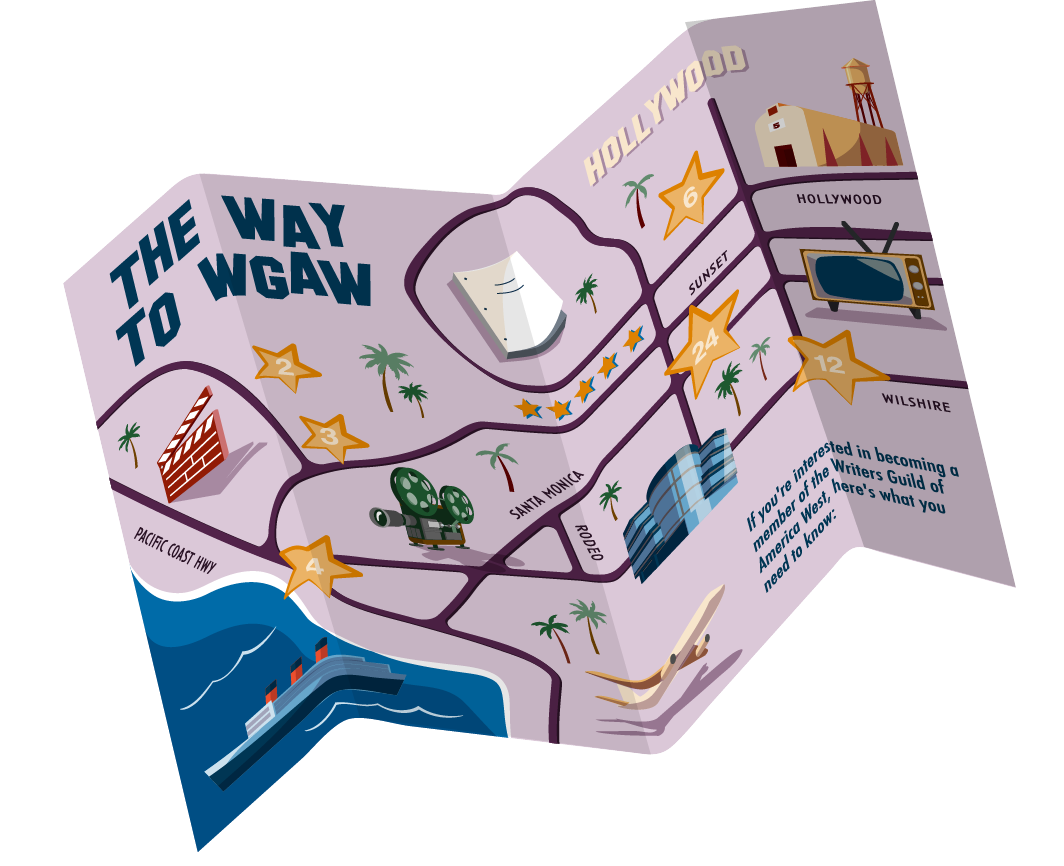Members
Updated November 2025
The Screenwriters Handbook focuses on key career tips and information that will be especially useful for newer members as they orient themselves to life as a WGA screenwriter. The handbook lists numerous Guild resources, including who to contact with specific questions. You'll find links to informational pages detailing topics such as negotiating a deal or understanding credits. It walks you through your rights and benefits as a Guild member and offers advice on key screenwriter issues like free work. Please take the time to browse this page and take advantage of the support and resources offered within.
Please contact Member Organizing for a print copy of this handbook or for more information about screenwriter education and organizing, including the WGAW New Member program, Captains program, Screenwriter Bootcamp, and more.
See Contact Us for a full directory of departments.
Guild Information
The WGAW is a democratic union run by an elected Board of Directors including three officers. Along with the Guild’s executive staff, the 19-member Board is responsible for setting the Guild's agenda and priorities, representing member concerns, designing and implementing Board initiatives, and strategizing for the future. Half of the Board is elected every year, and the officers are elected every two years. Members participate by voting in annual elections, attending Guild meetings, serving on committees, participating in the Guild’s Captains Program and by running for Guild office. See the Guild’s Constitution and Working Rules for more information.
The Officers and members of the Board can be reached via email.
The WGAW Captains Program helps members stay informed and engaged and supports the Guild’s strategic agenda. Captains are involved in important matters related to collective bargaining, contract enforcement, organizing, and public policy. Captains act as liaisons between a team of members and the Guild and have a unique opportunity to discuss important issues with other Captains, elected leadership, and Guild staff. Member Organizing provides staff support, education, and training to help Captains assume an active leadership role.
In addition to official WGA communications, Captains are one of your best sources of information for Guild news and are particularly focused on the issues many screenwriters care about, including free work and late pay, as well as industry trends that will impact writers moving forward.
If you would like more information about the Captains Program, please contact Captains to get started.
The WGAW's Inclusion and Equity Department works with industry personnel to develop access and talent development programs. It also hosts events, panels, and seminars to promote a more positive image of historically underrepresented writers, to increase the industry's awareness of the unique obstacles often faced by these writers, and to encourage positive changes in hiring practices.
Currently, there are 11 Inclusion and Equity committees: the Asian American Writers Committee, Career Longevity Committee, Committee of Black Writers, Committee of Women Writers, Disabled Writers Committee, Jewish Writers Committee, Latinx Writers Committee, LGBTQ+ Writers Committee, Middle Eastern Writers Committee, Native American & Indigenous Writers Committee and the South Asian Writers Committee.
As part of efforts to call attention to the lack of inclusion and equity in the entertainment industry, the WGAW releases an annual Screen Inclusion Report which provides data on the feature film industry from that calendar year.
For more information on programming, contact the Inclusion and Equity Department.
Your Contractual Rights and Benefits
Please make sure that any deal you make, including an option/purchase agreement for an original spec scripts, is with a WGA signatory company to ensure you receive the MBA protections writers have fought for and achieved, including initial compensation minimums, credit procedures administered by the Guild, residuals, and pension and health benefits. You can check a company’s signatory status through the Signatory Company Confirmation Lookup; please contact our Signatories Department (323) 782-4514 if you have any questions about a company’s signatory status. Remember the Guild’s Working Rule #8 states: “No member shall accept employment with, nor option or sell literary material to, any person, firm or corporation who is not a signatory to the applicable MBAs.” You can find information about the procedures for becoming a signatory here.
There are screen minimums for each type of literary material (e.g., first draft, rewrite, polish). A summary of MBA-minimum screen compensation can be found on pages 1–5 of the Schedule of Minimums.
Screenwriters should also be aware of important gains made in 2023 negotiations, which are:
- A second step—i.e., a rewrite—is now required when a writer is hired for a first draft screenplay for 200% of minimum or less. This requirement also applies to purchases of screenplays from “professional writers ” at 200% minimum or less.
- In addition to a commencement payment of 50% of their fee for the step, screenwriters hired on a flat deal basis for 200% of minimum or less who have not delivered within 9 weeks of commencement are due 25% of their fee for the step once the company has been invoiced; the remaining 25% is due upon delivery. This payment structure applies to each step of the writer’s deal if the fee is 200% or less of the minimum for that step.
- When a writer is contracted under the New Media Sideletter to write a streaming feature with a budget of $30 million, the minimum initial compensation for a story & teleplay is $100,000 (an 18% increase from the current rate).
Please contact the Contracts Department if you have any questions about the Schedule of Minimums or the MBA.
While the MBA establishes minimum compensation, writers are able to—and should wherever possible—negotiate “overscale” terms, or terms that exceed the MBA minimums. MBA minimums are intended to act as a “floor.” They are not the ceiling. Both the Screen Compensation Guide and the Screen Compensation Guide For Streaming Services can help feature writers and their reps negotiate higher pay. These and other resources can be found in the Writers’ Deal Hub, a centralized resource dedicated to helping writers negotiate their individual overscale deals. The Agency Department can also provide customized research on comparable deals to assist you and your representatives in your individual deal negotiation; we encourage screenwriters to make use of this resource.
Negotiating for the initial compensation you want in your screen deal isn’t the only deal point that matters. Here are some other key items to keep in mind:
Issues Related to the Intended Market
Even if a company says it doesn’t know where the film you are writing will be exhibited, you can negotiate for the project to be treated as a theatrical film for all purposes under the MBA.
If you are making a deal for a feature-length project for a streamer that will be contracted under new media terms rather than theatrical terms, please be aware that the company may try to apply the MBA’s application of excess provision to credit your overscale (above minimum) writing compensation against future residuals. You can address this in your deal by negotiating for no crediting of overscale.
Bonuses
If you are hired to write a theatrical motion picture, it is customary to include bonuses tied to screen credit or production. The MBA does not have provisions that provide for bonus compensation, so you have to negotiate bonuses in your individual deal. Pension and health contributions are also payable on bonuses, up to the cap.
To learn more about these and other deal points, see the Writers' Deal Hub Screen Deal Tips.
The Contracts Department answers all MBA-related questions except those specifically pertaining to residuals, credits, or the status of legal arbitration claims. Please email the Contracts Department if you need help addressing any of the wide range of issues arising from the MBA and writers’ individual contracts. As noted above, the Guild can also provide custom research on comparable deals to assist you in your individual deal negotiation; please reach out to the Agency Department for assistance.
WGA signatory companies are required to make pension and health contributions on all projects covered under the MBA, paid at the rate of 11.25% to the Pension Plan, 13% to the Health Fund (effective May 2, 2025), and 0.5% to the Paid Parental Benefit Fund.
Pension contributions are made on earnings up to a per-project cap of $225,000 and health contributions are capped at $250,000 annually. As a result of the 2023 MBA negotiations, writers on teams get pension and health contributions as individuals rather than splitting the cap.
When selling a spec script, it is extremely important to negotiate for a rewrite or polish because the purchase of literary material requires P & H contributions only when a rewrite or polish is attached (options and sales alone are NOT eligible because they are not work for hire). To that end, please be aware that under the 2023 MBA, the purchase of a screenplay (original or non-original) from a professional writer at 200% or less of the applicable minimum requires a second step (rewrite). In addition, if you option your original screenplay, Article 16.A. of the MBA, requires the Company to offer you the opportunity to perform the first rewrite during the option period. Please contact the Contracts Department if you have questions on either of those provisions.
To become eligible for one year of Health Fund coverage, you must have covered earnings reported to the Fund (and contributions paid on those amounts) during a period of four or fewer consecutive calendar quarters equal to the current Writers Guild of America minimum for a one-hour network prime-time story and teleplay (See the current earnings minimum). Please be aware that the minimum to qualify will increase on May 2 each year of the MBA with any negotiated increases in Guild minimums.
Contact WGA Pension & Health Plans at (818) 846-1015 to confirm the amount of contributions made on your behalf and to inquire about your qualification for health coverage.
Read “WGA Pension and Health: What Every Screenwriter Needs to Know” for some useful tips to help you maintain your WGA health insurance and build toward your retirement.
As the result of the Guild’s 2020 negotiations with the AMPTP, a portable Paid Parental Leave (PPL) benefit was added to the MBA, the first of its kind under industry-wide collective bargaining.
For writers covered under the Health Plan, the PPL benefit is $2,000 per week up to eight weeks, which need not be taken consecutively. The PPL benefit is available for a 12-month window from the date of birth, adoption, or placement of your child.
In order to receive PPL benefits, participants must not work for an employer during the period for which the PPL is taken. A residual, production bonus, or other similar deferred payment received during the benefit period will not interfere with eligibility.
If both parents are WGA writers who are eligible for Writers Guild health coverage at the time of birth, adoption, fostering, or placement for adoption, then each is separately eligible for the paid parental leave benefit.
Participants should receive a PPL enrollment package once they declare their new dependent. If this doesn’t happen, or if you have any questions or concerns, please feel free to contact the Health Fund at (818) 846-1015 or toll-free (800) 227-7863 or via email.
Residuals are compensation for the reuse of a credited writer's work on Guild-covered movies, television, and new media programs. The Guild monitors, collects, and distributes these payments.
Typically, residuals for theatrical projects are due to the Guild on a quarterly basis. In addition to this FAQ, answers to questions about residuals can be found in the “Residuals Survival Guide.”
The Residuals Lookup allows members to determine their residuals earnings by project, specific years, or market back to 1981. You can also contact the Residuals Department with any questions.
In addition, the Guild’s website has a feature, accessible via your myWGA account that allows members to view other payment records, such as foreign levies, legal settlements, contract settlements, and late payment claims. Simply log into your myWGA account and select the “Non-residuals Payments” tab.
The Guild determines credits on WGA-covered projects. Following the completion of principal photography and any re-shoots, the company is required to submit a Notice of Tentative Writing Credits (NTWC) listing the participating writers and the form of proposed credit. If you believe you should be a participating writer on a project and have not received a Notice of Tentative Writing Credits, you should immediately email the Credits Department or call (323) 782-4528 so that the Credits staff can investigate. Delays can seriously interfere with your creative rights.
Please note: in some cases, the proposed credits are subject to automatic arbitration, and in others, writers may protest the proposed credits to trigger an arbitration.
Credits are the lifeblood of a screenwriter’s career. Critical information regarding how to protect your credit and manage arbitrations can be found in the Credits Survival Guide.
Every screenwriter should refer to this guide, as well as the Screen Credits Manual, anytime a movie you’ve worked on goes into production.
If you receive credit on a project, you will be eligible for residuals, certain creative rights, and possibly separated rights under the MBA. For more details, see the Credit Rules for Original Screenplays and Non-Original Screenplays.
All participating writers on theatrical features are eligible to receive an Additional Literary Material credit.
If you are a writer who created an original screenplay that never got produced and you would like to set up your work at another company, there is a provision in the MBA that allows writers to buy back their unproduced, original literary material, referred to as “reacquisition.” Under that provision, the writer can reacquire—or buy back the script—by paying back costs related to the literary material only.
In order to be eligible for reacquisition, there are certain requirements that must be met and there is a limited window of time in which the literary material may be reacquired. Since this could be a time-sensitive matter, call or email the Contracts Department at (323) 782-4501.
Many of the creative rights under the WGA Minimum Basic Agreement are time-sensitive and it helps if a writer is aware of their creative rights in order to best enforce them. Here are just some of the rights you need to look out for during pre-production, principal photography, and post-production:
You have the right to...
- Know how many people are pitching on a project.
- Meet with the director during pre-production if you are the current writer.
- Visit the set during production.
- View a cut of the film prior to picture lock and give notes.
- Participate in the press junket, and to be included in the press kit.
- Attend the premiere of the film.
You can read more information here: Know Your Rights—Creative Rights.
If you have any questions or are experiencing any difficulties concerning any of the creative rights provisions, please contact Creative Rights.
The Guild is a democratic union and non-profit organization that is funded largely through member dues. Dues are an investment in your Guild that ensures it has the capacity to negotiate and enforce the MBA as well as your individual contract, and allows the Guild to provide the many programs that benefit members.
The Dues Department is responsible for collecting and maintaining Current Member Declaration of Gross Earnings. Dues invoices collect 1.5% of applicable gross earnings plus $25.00.
If you have questions about what earnings to declare and when to pay WGAW dues, read Declaring Your Earnings for WGAW Dues.
As a WGA member, you are required to declare your earnings on a quarterly basis by sending the Guild a Declaration of Gross Earnings form by mail, online via your myWGA account, or by telephone.
Members who are not up to date on their dues are not eligible to run for union office or vote in union elections and may be subject to reinstatement fees
Key Work Issues
Under the MBA, you, the writer, have the power to determine when a draft is done and have the right to make delivery in order to trigger payment for the step. You can and should say no to studio or producer demands for unpaid drafts when you’ve determined your draft is complete.
Often, however, writers are under immense pressure by producers, studio execs, or reps to keep revising a draft for free. These types of rewrites are often called “producer drafts” or “producer passes,” since it is typically a producer who is requesting the additional uncompensated work. In some circumstances, a writer may also be asked to complete writing steps not included in their contract prior to being commenced to draft. A common example of this is an extra-contractual treatment. If a producer or studio asks you for free work, please contact Screen Enforcement Specialist/Organizer Cathy Genovese as soon as possible to have a confidential conversation about your situation and how best to push back against the free work demand. The Guild has successfully fought to get writers paid for extra-contractual treatments and unpaid guaranteed steps, along with interest for late payments.
As mentioned, the 2023 MBA includes key provisions aimed at curbing free work abuse. In addition to getting a commencement payment of 50% of their fee for a step, screenwriters hired on a flat deal basis for 200% of minimum or less who have not delivered within 9 weeks of commencement are due 25% of their fee once the company has been invoiced. This accelerated payment structure applies to each step of the writer’s deal if the fee is 200% or less of the applicable minimum for that step.
The MBA prohibits uncompensated writing for a company. Producers and studios should never ask writers to leave behind their pitch materials. But if they do, writers should say no unless the studio or producer agrees to pay for it.
"Leave-behinds" can include pitch notes, pitch decks, outlines, and treatments. Any work a writer does to prepare a pitch or take a meeting is the sole property of the writer.
Recently, the Guild has heard reports of the Zoom transcription function being used to record and transcribe writers’ pitches delivered over Zoom. Recording a person without their consent is unlawful in California. If you are asked to consent to such a recording, you should refuse. Transcribing a writer’s pitch is the equivalent of demanding that a writer leave written material behind.
Please consider that when even one writer agrees to leave material behind, this makes it harder for other writers to resist the same request.
If you are asked to leave behind work prior to employment, or if you believe that your Zoom pitches are being unlawfully transcribed, please contact Screen Enforcement Specialist/Organizer Cathy Genovese for assistance. The Guild may, in certain circumstances, be able to pursue compensation on your behalf.
Let's hold the line against free work by making sure no writing is left behind.
This term is commonly used when a studio or company invites a large number of writers to pitch on the same project, often multiple times. As long as the studio or company does not ask for free writing or leave-behinds, oral pitches are not prohibited by the MBA.
However, if you are invited to pitch or be interviewed for possible employment on a theatrical project, you have the right to ask if other writers have been invited to pitch and how many. The company must tell you the approximate number of writers invited to pitch on the project so you can decide whether it’s worth your time to pursue the opportunity.
To help screenwriters be more informed at the initial point of contact on any feature project, the Guild has created the Project Page.
The Project Page collects all the key information in one document, such as: the logline, how many other writers are competing for the job, how long the project has been in development, or if there is a director, actor, or other talent attached and whether IP rights have been secured.
Have your reps ask the producers to fill out the form before sending projects for your consideration. Alternatively, you can simply send the form directly to a producer yourself. Project Pages allow you to begin the conversation on any new project with transparency.
Screenwriting 101
There are many things to consider when deciding whether to write something on spec. Do you have the time? Can you afford it? Do you have the heart and passion for this particular project? Is this something that could be used as a calling card or lead to other work down the road? And perhaps most importantly, will you retain full control of the material in the event the project doesn’t sell?
Writing on spec when other producers control underlying material can be a very perilous situation. If you find yourself being approached in such a manner, we highly encourage you to seek advice on how to best handle your specific situation.
Before deciding whether it’s worth your time to pitch on a particular open writing assignment (or “OWA,” as they’re called), make sure you ask your reps and the producers the following questions:
What’s the process for getting hired? Is there a timeline? How much creative work will you have to invest in order to get the job? Has the studio committed to hiring a writer no matter what? Do you like the people involved? And most importantly, is the project a priority for the studio?
The Project Page can help you and your reps answer all these questions.
If there’s underlying material or intellectual property, make absolutely certain that the studio has secured the rights before doing any work. And remember to ask how many writers are pitching for the job and consider whether it’s worth your time given the depth of competition.
General meetings can be a great way to develop relationships and broaden your creative network. They can also lay the groundwork for future jobs. In many ways, the same rules apply to general meetings as any other job interview.
Research the company and executives you’re meeting beforehand, be pleasant and professional, see if you click creatively, and try your best to be seen as someone collaborative who’d be fun to work with.
It’s always a good idea to have projects ready to discuss that seem like they’d fit the company’s needs. Try to leave the meeting with an open line of communication so you can continue to discuss other projects and opportunities at a later date.
As is the case with any professional relationship, open communication is vitally important. Be realistic with your timelines, try to keep producers and executives updated throughout your writing process, be honest and straightforward when things aren’t working or when you feel adjustments need to be made. Try to be as collaborative as possible by making sure everyone feels involved.
Be careful of executives who try to function as “writers in hiding.” Draw clear boundaries and stick to them. Don’t feel like you have to say “yes” to every note or suggestion. Remember, you’ve been hired for your talents and abilities, as well as your specific take on the material. Don’t ever feel like you have to be a rubber stamp for someone else’s creative agenda.
If you get a set of written or verbal notes, consider sending a detailed response back, outlining which notes you have a clear handle on and others that may need further clarification. Remember, being a writer is a lot like being a doctor. Your patient will tell you what’s bothering them, but it’s up to you to figure out what’s really causing the problem and how best to treat it.
If a particular note doesn’t work, be respectful and carefully explain why it didn’t work. Don’t be defensive and don’t feel like you have to solve everything during a notes meeting. Listen and ask for clarification, then take some time to come up with comprehensive solutions.
It’s a good idea to seek feedback from everyone in the room, regardless of their title. Remember, today’s assistants are tomorrow’s studio heads. This will pay dividends for you down the road.
Roundtables can be a great way to meet other writers and pave the way for future work. In fact, it’s not uncommon for the best writer in a roundtable to be the next writer hired on the project.
Come prepared. Make sure to read the screenplay or the prompts for the mini-room to ensure you’re clear on the specific goals for the session. Is it a comedy punch-up? Are you focusing on character? Are you helping to re-break the third act? You should tailor your ideas and suggestions accordingly.
In essence, you’re functioning like a TV writing staff, so come armed with a few ideas and be prepared to expand on them with the other writers in the room.
You should not be asked to produce any written material in a mini-room or leave behind any pages, but you should be compensated for your services. Roundtable writing is still writing, and companies should not mischaracterize your services as production work. Contact the Legal Department at (323) 782-4521 if you have any questions about the compensation that you are owed for your roundtable or screen mini-room services, or if you need assistance getting paid.
Be gracious if you’re removed from a project and don’t take it as cause for embarrassment or shame. You will quickly come to learn that replacing writers is very common in our business.
Try to maintain professional relationships and don’t burn any bridges. That way, executives and producers will be inclined to hire you on future projects. If you’re rewriting someone else, reach out to let them know. Thank them for all their hard work (without which you wouldn’t have a job) and ask for their counsel and advice. After all, they were in the trenches you’re about to set foot in and can probably provide a wealth of information about the creative and political dilemmas you will be facing.
Unless you’re doing a page-1, don’t try to rewrite the entire script in a new voice. Don’t make superficial adjustments just to diminish previous writers’ work. Never remove another writer’s name from the title page. Remember, you’re part of a team and the golden rule applies: try to treat the previous writers with the same consideration you’d expect to be given yourself.
Writers often fall into a trap early in their careers. They’re so thankful to have an agent or manager, they forget the agent or manager actually works for them!
It’s important to remember that when it comes to your reps, you’re in the driver’s seat. It’s your responsibility to properly communicate what you need and what you expect to be done on your behalf. Writers who take an active role in curating and crafting their careers are often afforded more respect and attention from their reps than those who don’t.
Don’t be afraid to ask for strategy calls so you can talk at length about short- and long-term goals. If you hear about a project you think you might be right for, don’t be timid about asking your reps to make a submission on your behalf. If they tell you you’re not qualified, ask them why not? And more importantly, ask what steps can be taken to ensure you’ll be qualified for similar projects down the road.
Let your reps know what you’re passionate about and what you’re dying to write. Consider their feedback when developing a spec, but remember: it’s your name on the title page, not theirs. If they have other clients you’d like to meet and collaborate with, ask for an introduction. Be proactive about giving them directives. Again, you’re in the driver’s seat. Don’t be complacent.
And at the end of the day, if you’re unhappy with their performance, be candid and tell them. Ask how things can be better. If the answer is they can’t be, consider making a change. Having a bad rep can be worse than having no rep at all. You want someone in your corner who’s as passionate about your writing as you are and who’s doing everything possible to advance your career.
The Guild is here to help you and, like most relationships, what you get out of it is directly proportional to what you put in. Your union’s vitality and strength rest entirely on the membership being actively engaged with Guild communications, elections, and negotiations.
Guild members have fought long and hard for the protections you enjoy. As a Guild member, your help enforcing our contract is crucial. Be vigilant, advocate for yourself and remember, the Guild is here to help enforce your rights.
This is a tough business and the best way to navigate it is to stay informed, stay in touch, and be of service to your fellow writers. If you’ve read this far, you’re off to a great start.
Best of luck!






